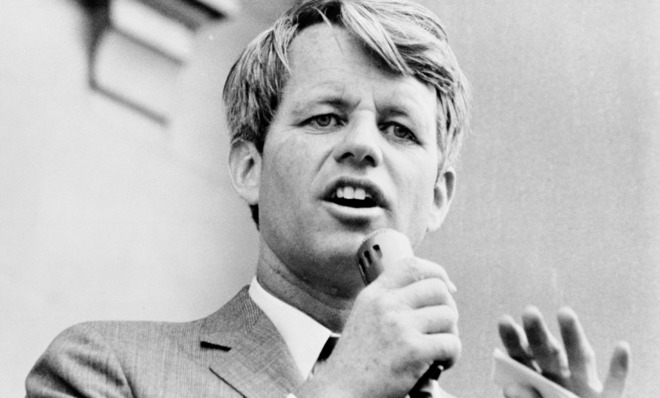What Paul Ryan could learn from Robert Kennedy about reforming the welfare state
The liberal lion didn't like welfare, either. But his objections only accentuate the cruelty of the modern GOP's anti-poverty platform.


A free daily email with the biggest news stories of the day – and the best features from TheWeek.com
You are now subscribed
Your newsletter sign-up was successful
When you make a purchase through links on our site, we may earn a commission
"[M]illions of our people are slaves to dependency and poverty, waiting on the favor of their fellow citizens to write them checks."
Is that another dose of racial commentary out of Cliven Bundy's Nevada ranch? Nope — it's Robert Kennedy in a May 1968 policy paper from his presidential campaign. Kennedy split with his liberal contemporaries over welfare, believing that dependency batters the recipient's soul. "To be without work," he said, "to be without use to one's fellow citizens, is to be in truth the Invisible Man of whom Ralph Ellison wrote."
The Week
Escape your echo chamber. Get the facts behind the news, plus analysis from multiple perspectives.

Sign up for The Week's Free Newsletters
From our morning news briefing to a weekly Good News Newsletter, get the best of The Week delivered directly to your inbox.
From our morning news briefing to a weekly Good News Newsletter, get the best of The Week delivered directly to your inbox.
While much of the commentary on Bundy has focused on his abhorrent defense of slavery, his broader argument about the ruinous effects of welfare dependency is not a new idea, especially in conservative circles. Rep. Paul Ryan (R-Wis.), for instance, who is in the midst of yet another anti-poverty PR blitz, has warned that "we don't want to turn the safety net into a hammock that lulls able-bodied people to lives of dependency and complacency, that drains them of their will and their incentive to make the most of their lives."
So would Kennedy, the liberal hero who crusaded against crushing poverty in Appalachia and our cities, have agreed with Ryan on issues of welfare and unemployment? Not quite.
Where Ryan sees welfare dependency as a wasteful moral failing by the poor, Kennedy saw something else. Kennedy saw those on welfare yearning for "the kind of employment that lets a man say to his community, to his family, to the country, and most important, to himself, 'I helped to build this country. I am a participant in its great public ventures. I am a man.'" Welfare dependency imposes democratic harms, Kennedy thought, ostracizing recipients from public life and depriving them of a sense of ownership in their communities.
Importantly, Kennedy coupled his critique of welfare with a solution: More jobs. "The answer to the welfare crisis is work," he said. "We need... dignified employment at decent pay." He called for public and private reinvestment in low-income communities to put people to work. Relying on government aid was not enough, for "[a]ny such scheme, taken alone, simply cannot provide the sense of self-sufficiency, of participation in the life of the community, that is essential for citizens of a democracy."
A free daily email with the biggest news stories of the day – and the best features from TheWeek.com
When conservatives talk about our safety net programs, we hear little of the civic costs of joblessness, the existential anguish of those who find themselves dependent on subsidies, or the need to blunt the harsh edges of the market. Conservatives like Ryan are committed to the idea that poverty is a personal failure rather than a market failure — that it's the result of a "tailspin of culture" that has led to "generations of men not even thinking about working or learning the value and the culture of work." Wedded to the belief that the market is a meritocracy, conservatives can only point to the poor themselves and to the government as the principal causes of poverty, which leads to bizarre and cruel policy proposals in which crucial safety net programs are gutted with nothing to replace them.
Welfare reform in the United States has nonetheless largely followed the conservative track. It is long on tying safety net programs to the whims of the market and making benefits stingier, but short on providing concrete access to employment. Kennedy's vision of defeating the psychic ravages of welfare with robust public and private employment efforts has not been borne out, despite recessions and decaying infrastructure that demand precisely this sort of worker mobilization.
In the wake of the Great Recession, the government has basically accepted high unemployment as a new normal. Kennedy spoke in the heady days when unemployment was a paltry 3.6 percent and full employment seemed within reach. Today, we've acquiesced to a painfully slow but steady comedown from 10 percent unemployment at the height of the recession in 2009 — a number that becomes far greater when we include those who have given up hope of finding work.
If we've accepted a market economy that creates this kind of unemployment, then it's brutally unjust to cast moral judgment on those who are on the losing end of that economy. The conservatism of Bundy and Ryan would have us believe that these people just aren't trying hard enough — that they've been sapped of work ethic by government handouts. To liberals like Kennedy, the real tragedy is that despite a fundamental yearning for meaningful work, the market won't provide millions of people with any work at all.
As Kennedy told us, "Human beings need a purpose. We need it as individuals; we need to sense it in our fellow citizens; and we need it as a society and as a people." If welfare is not the solution, then good jobs and a fairer economy must be.
Joel Dodge writes about politics, law, and domestic policy for The Week and at his blog. He is a member of the Boston University School of Law's class of 2014.
-
 ‘Restaurateurs have become millionaires’
‘Restaurateurs have become millionaires’Instant Opinion Opinion, comment and editorials of the day
-
 Earth is rapidly approaching a ‘hothouse’ trajectory of warming
Earth is rapidly approaching a ‘hothouse’ trajectory of warmingThe explainer It may become impossible to fix
-
 Health insurance: Premiums soar as ACA subsidies end
Health insurance: Premiums soar as ACA subsidies endFeature 1.4 million people have dropped coverage
